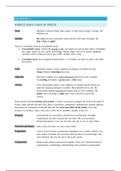GRAMMAR A
WORD CLASSES/ PARTS OF SPEECH
Noun Identifies a person, thing, idea, quality or state such as anger, courage, life,
luckiness etc.
Articles the, a/an are most commonly used in front of the noun. Example: the
dog, a dog, an apple.
There are countable nouns & uncountable nouns:
Uncountable nouns: Used with singular verbs, we cannot use a/an & don’t add -s. Examples:
tea, sugar, water, air, rice, music, knowledge, beauty, anger, fear, love, money, spaghetti,
research, safety, evidence, bred, news, traffic, trouble, snow, work.
Countable nouns: have singular & plural forms +s. Example: one girl, two girls. One table,
four tables.
Verb Describes actions, events, situations & changes. Example: the dog
sleeps, Maria is watching television.
Adjective Describes a noun, gives extra information about the noun. Example:
An exciting adventure, a green apple, a tidy room.
Adverb: Gives information about a verb, adjective or another adverb which can
make the meaning stronger or weaker. Most adverbs end in -ly. The
adverb often appears between the subject and its verb. Example: She
nearly lost everything, I really don’t care, I so want to go to the
concert.
Some adverbs tell the location of an action, or where it occurred, example: He lived in the north of
France, other adverbs like this: here, there, everywhere, somewhere, underground, outside, upstairs,
downstairs etc. Examples of adverbs that tells the occurrence/time of the action: First, last,
tomorrow, yesterday, today, early, later, often, never, monthly, usually, always etc.
Pronoun Used instead of a noun that’s already known/mentioned. Example:
Cindy(noun) left early because she was tired. She is the pronoun.
Personal pronouns: I, me, you, he, him, she, her, it, we, us, they, them.
Possessive pronouns mine, yours, his, hers, its, ours, yours, theirs.
Preposition Used in front of nouns or pronouns. Examples: on, in, under, behind, over,
near, before. Example: He sat on the chair, he drove over the bridge, they
were sitting by the tree, the sun is above the clouds.
Conjunction Holds words, phrases and clauses together. There are 3 different kinds of
conjunctions: coordinating, subordinating, and correlative conjunctions.
, COORDINATION CONJUNCTION
They can join together words, phrases and independent clauses. Remember “FAN BOYS”:
For - Explains reason or purpose (just like “because”). I go to the park every Sunday, for I
love to watch the ducks on the lake.
And - Adds one thing to another. I go to the park every Sunday to watch the ducks on the
lake and the shirtless men playing soccer.
Nor - Used to present an alternative negative idea to an already stated negative idea. I
don’t go for the fresh air nor really for the ducks. Honestly, I just like the soccer.
But - Shows contrast. The soccer in the park is entertaining in the winter, but it’s better in
the heat of summer.
Or - Presents an alternative or a choice. The men play on teams: shirts or skins.
Yet - Introduces a contrasting idea that follows the preceding idea logically (similar to
“but”). I always take a book to read, yet I never seem to turn a single page.
So - Indicates effect, result or consequence I’ve started dating one of the soccer
players, so now I have an excuse to watch the game each week.
SUBORDINATING CONJUNCTION
A subordinating conjunction always introduces a dependent clause, tying it to an independent clause.
In contrast to coordinating conjunctions, a subordinate conjunction can often come first in a sentence.
In English, there are lots of subordinating conjunctions, but the most common ones are "after,"
"although," "as," "because," "before," "how," "if," "once," "since," "than," "that," "though," "until,"
"when," "where," "whether," and "while." Here are a few examples of how subordinating
conjunctions are used:
“Because of you, I never stray too far from the sidewalk”.
“If you leave me now, you’ll take away the biggest part of me”.
“When I see you smile, I can face the world”.
“You don’t know what you’ve got ‘til it’s gone”.
“I guess I’ll never be the same since I fell for you”.
“As I walk through the valley of the shadow of death, I take a look at my life and realize
there’s nothing left”.
CORRELATIVE CONJUNCTIONS
Correlative conjunctions are sort of like tag-team conjunctions. They come in pairs, and you have to
use both of them in different places in a sentence to make them work. They include pairs like
“both/and,” “whether/or,” “either/or,” “neither/nor,” “not/but” and “not only/but also.”
I either want the cheesecake or the frozen hot chocolate.
I’ll have both the cheesecake and the frozen hot chocolate.
I didn’t know whether you’d want the cheesecake or the frozen hot chocolate, so I got you
both.
Oh, you want neither the cheesecake nor the frozen hot chocolate? No problem.
I’ll eat them both - not only the cheesecake but also the frozen hot chocolate.
I see you’re in the mood not for dessert but appetizers. I’ll help you with those too.




